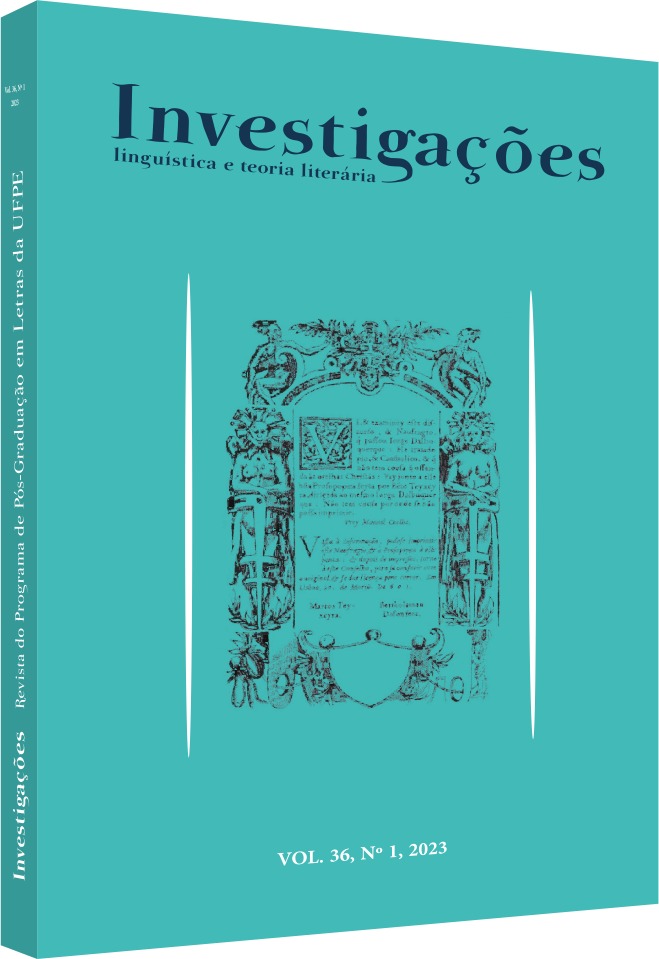The perverse reader: sovereignty and violence in the literary interpretation of Kafka and Camus
DOI:
https://doi.org/10.51359/2175-294x.2023.258337Keywords:
recepção literária, soberania, pragmática, comunicação, legitimidadeAbstract
This article studies the pragmatic effects of reader sovereignty when interpreting literary texts. Based on Letter to the Father, by Kafka, and The Stranger, by Camus, it verifies the ways in which readers interpret the experiences of the subjects (Kafka himself, sender of the letter; or Meursault, narrator-character of Camus) and feedback what these same subjects suffer. Methodologically, Jakobson and Watzlawick, Beavin and Jackson are used. Kafka reverses the father's double binds to escape the untenable situation. Meursault maintains his posture, delivering the interpretation of his destiny to readers and other characters, being killed at the end of the plot.
References
BARTHES, Roland. O rumor da língua. São Paulo: Martins Fontes, 2012.
BATESON, Gregory. Mente e Natureza. Tradução: Claudia Gerpe. Rio de Janeiro: F. Alves, 1986.
BLANCHOT, Maurice. O espaço literário. Rio de Janeiro: Rocco, 1987.
CAMUS, Albert. O estrangeiro [recurso eletrônico]. Tradução: Valerie Rumjanek. Rio de Janeiro: Record, 2019.
COSTA LIMA, Luiz. História. Ficção. Literatura [recurso eletrônico]. São Paulo: Companhia das Letras, 2006.
EAGLETON, Terry. Como ler literatura: um convite [recurso eletrônico]. Porto Alegre: L&PM Editores, 2019.
EVA, Luiz Antonio Alves. O primeiro cético (acerca da coerência do pirronismo). In: SILVA FILHO, Waldomiro José (Org.). O Ceticismo e a possibilidade da Filosofia. Ijuí: Editora Unijuí, 2005, p. 45-86.
FEYERABEND, Paul. Contra o método. Rio de Janeiro: F. Alves, 1977.
FREUD, Sigmund. Esboço de psicanálise [recurso eletrônico]. Londres: Hogarth Press e Instituto de Psicanálise, 1949.
ISER, Wolfgang. O ato da leitura: uma teoria do efeito estético vol. 2. São Paulo: Editora 34, 1999.
JAKOBSON, Roman. Linguística e comunicação. São Paulo: Cultrix, 2010.
KAFKA, Franz. Carta ao Pai [recurso eletrônico]. São Paulo: Companhia das Letras, 1997.
LÉVI-STRAUSS, Claude. Totemismo hoje. Petrópolis: Editora Vozes, 1975.
LEVINAS, Emmanuel. Ética e Infinito. Lisboa: Edições 70, 1982.
METCALF, Linda. Solution Focused Narrative Therapy [recurso eletrônico]. New York: Springer Publishing Company, 2017.
PELBART, Peter Pál. Vida capital: ensaios de biopolítica. São Paulo: Iluminuras, 2011.
PIMENTEL, Davi Andrade. ‘Amerika’, de Franz Kafka: de pai para filho. Gragoatá, Niterói, v. 23, n. 45, p. 68-91, 30 abr. 2018. Disponível em: https://periodicos.uff.br/gragoata/article/view/33565. Acesso em 16 jun. 2023.
ROSENFELD, Anatol. Texto/Contexto I. São Paulo: Editora Perspectiva, 1996.
SKINNER, Burrhus Frederic. Sobre o behaviorismo. São Paulo: Cultrix, 1974.
SKINNER, Burrhus Frederic. O comportamento verbal. São Paulo: Cultrix, 1978.
WATZLAWICK, Paul; BEAVIN, Janet Helmick; JACKSON, Don D. Pragmática da comunicação humana: um estudo dos padrões, patologias e paradoxos da interação. São Paulo: Cultrix, 1993.
WILLIAMS, Raymond. Culture & Society: 1780-1950. Garden City: Anchor Books, 1958.
WITTGENSTEIN, Ludwig. Tractatus logico-philosophicus. São Paulo: Editora Nacional, 1968.
Downloads
Published
How to Cite
Issue
Section
License
Copyright (c) 2023 Rafael Sarto Muller

This work is licensed under a Creative Commons Attribution 4.0 International License.
Authors who publish with Revista Investigações agree to the following terms:
Authors retain copyright and grant the journal right of first publication with the work simultaneously licensed under the Creative Commons Attribution 4.0 International (CC BY 4.0) license that allows others to share the work with an acknowledgement of the work's authorship and initial publication in this journal.
Authors are able to enter into separate, additional contractual arrangements for the non-exclusive distribution of the journal's published version of the work (e.g., post it to an institutional repository or publish it in a book), with an acknowledgement of its initial publication in this journal.
You are free to:
Share — copy and redistribute the material in any medium or format for any purpose, even commercially.
Adapt — remix, transform, and build upon the material for any purpose, even commercially.
The licensor cannot revoke these freedoms as long as you follow the license terms.
Under the following terms:
Attribution — You must give appropriate credit , provide a link to the license, and indicate if changes were made . You may do so in any reasonable manner, but not in any way that suggests the licensor endorses you or your use.
No additional restrictions — You may not apply legal terms or technological measures that legally restrict others from doing anything the license permits.

